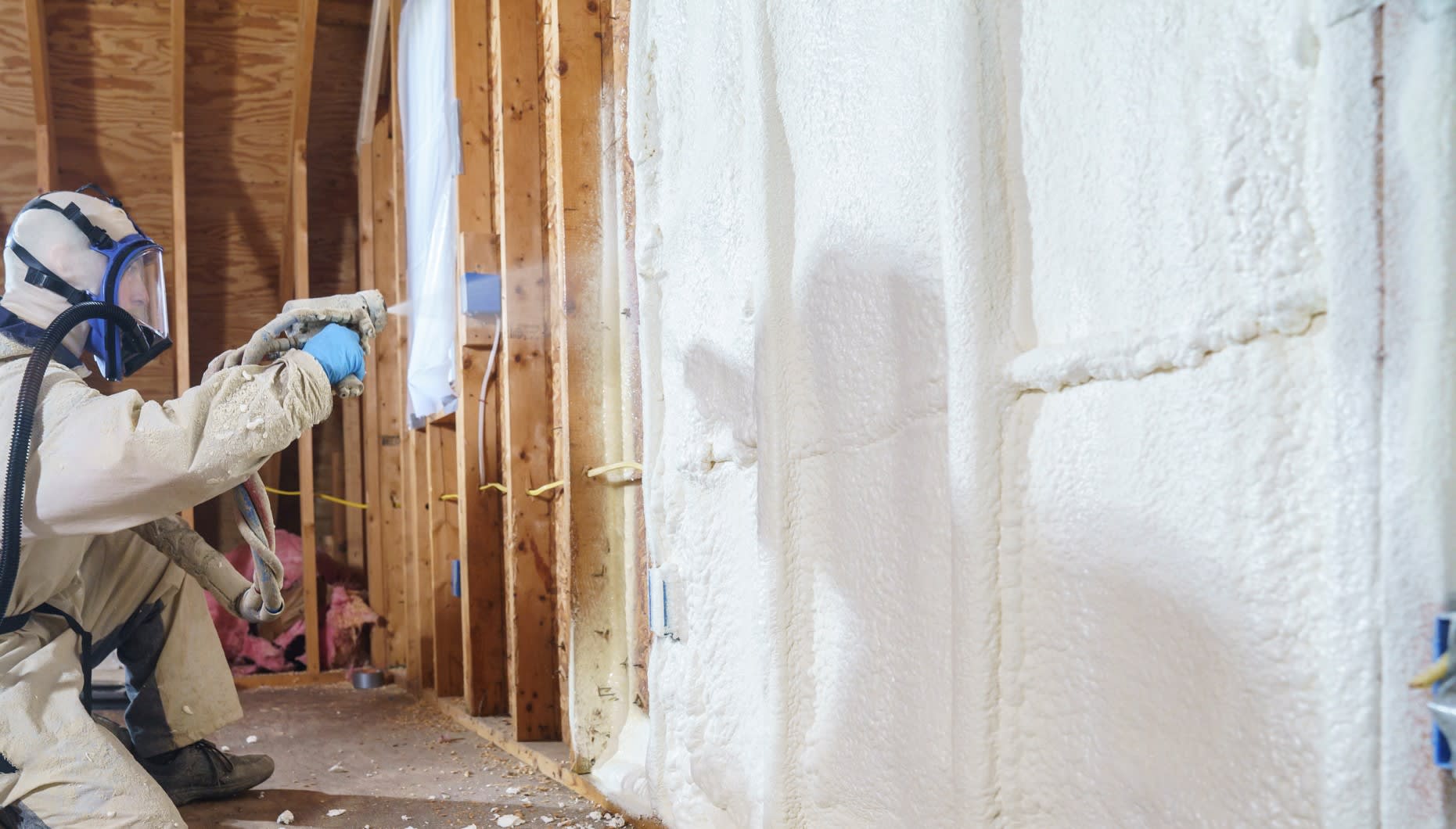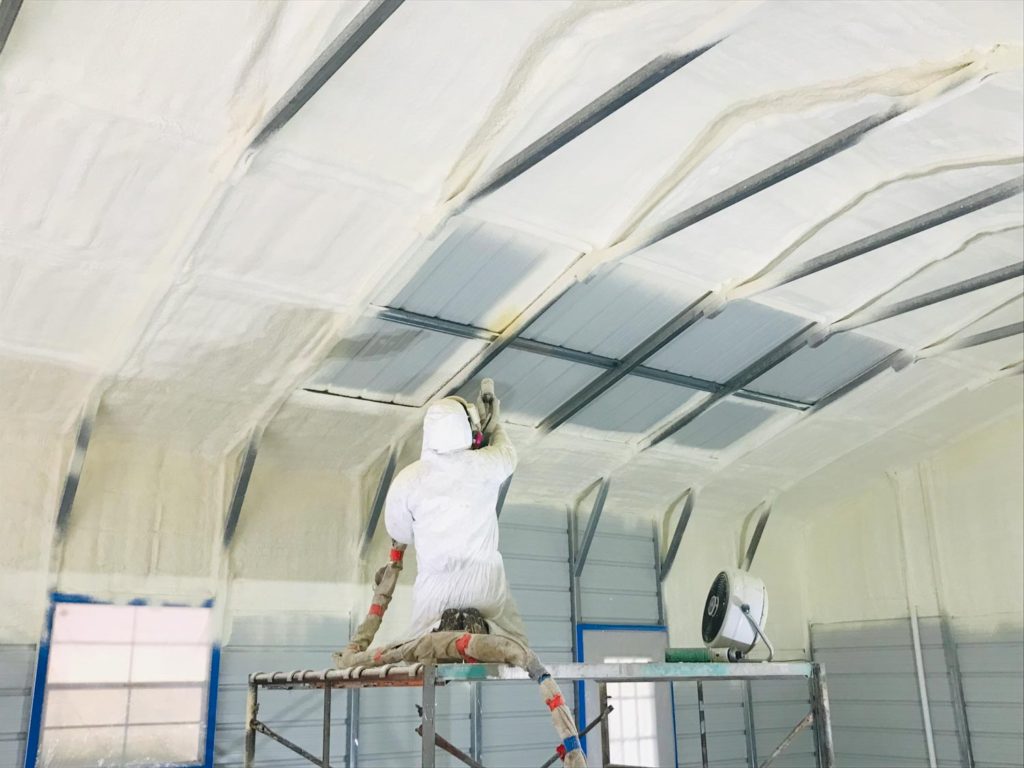Comprehending the Benefits of Using Spray Foam for Insulation Projects
Comprehending the Benefits of Using Spray Foam for Insulation Projects
Blog Article
Spray Foam: The Ultimate Remedy for Air Sealing and Insulation
Spray foam insulation has actually arised as a leading solution for efficient air sealing and thermal insulation, offering an unique combination of homes that set it apart from typical methods. Understanding the complete extent of its benefits, setup processes, and contrasts with various other insulation types is crucial for making informed choices.
What Is Spray Foam?
Spray foam is a versatile insulation material that combines the principles of air securing and thermal resistance to improve power efficiency in structures. Made up primarily of polyurethane or other similar substances, spray foam is used as a liquid that expands upon call with surfaces, producing a solid, constant layer of insulation. This distinct residential property permits it to fill up voids, splits, and gaps that traditional insulation materials might overlook, offering a superior air seal.
There are two main kinds of spray foam: open-cell and closed-cell. Open-cell spray foam is lighter and more versatile, using superb audio absorption and a lower R-value per inch - Spray Foam. On the other hand, closed-cell spray foam is denser, offering a greater R-value, wetness resistance, and included architectural stability to constructing parts
The application process generally includes specialized tools, making sure a seamless application that sticks to different substratums, consisting of concrete, steel, and timber. This flexibility makes spray foam suitable for both brand-new building and constructions and retrofitting existing frameworks. Its capacity to produce an impermeable obstacle significantly adds to reducing energy usage and improving indoor air high quality, consequently making it a favored selection amongst home builders and property owners alike.
Advantages of Spray Foam Insulation
One of the most considerable advantages of spray foam insulation is its outstanding capacity to produce a continual air barrier, which successfully reduces energy loss. Unlike typical insulation products, spray foam increases to fill splits and voids, making certain that air leakage is dramatically lowered. This particular not just improves power effectiveness however additionally leads to lower energy costs over time.
Additionally, spray foam insulation supplies premium thermal resistance, adding to an extra steady indoor atmosphere. Its high R-value per inch permits effective insulation in restricted rooms, making it suitable for attics, wall surfaces, and crawl rooms. Moreover, the moisture-resistant properties of spray foam help protect against mold and mildew and mildew growth, advertising healthier living conditions.
One more important advantage of spray foam insulation is its sound-dampening qualities (Spray Foam). It successfully reduces noise transmission in between areas, developing a quieter and a lot more comfortable home environment. The toughness of spray foam also sticks out, as it does not sag or resolve over time, maintaining its efficiency throughout its life expectancy
How Spray Foam Works
Understanding just how spray foam insulation works is vital for valuing its performance in air sealing and thermal resistance. Spray foam insulation includes two primary components: isocyanate and polyol material. When these parts are blended, they undergo a chain reaction that creates the material to increase rapidly, producing a thick foam that loads tooth cavities, cracks, and spaces.
As the foam expands, it sticks to surface areas, developing an impermeable seal that substantially decreases air seepage. This characteristic makes spray foam insulation very efficient at preventing drafts and moisture infiltration, which can result in power loss and damages with time. Furthermore, the closed-cell variant of spray foam provides superior try this website thermal resistance because of its rigid framework, efficiently decreasing heat transfer.
The distinct buildings of spray foam allow it to comply with uneven surfaces, making sure extensive coverage and a smooth barrier. As an outcome, spray foam insulation not just improves energy efficiency however likewise adds to enhanced interior air quality by lowering the buildup of toxins and allergens. Eventually, comprehending the technicians behind spray foam emphasizes its function as a superior option for insulation and air securing in both residential and business applications.
Installment Process Introduction

Prior to installation, the space must be sufficiently cleaned up and prepped, guaranteeing that surface areas are complimentary from dirt, debris, and moisture. Due to the fact that impurities can jeopardize Spray Foam adhesion and general efficiency, this step is critical. When the area is prepared, the application involves mixing both components of the spray foam, which expands upon contact and loads voids successfully.
Educated professionals should carry out the setup, utilizing customized tools to make certain uniform coverage and optimal density. Safety and security preventative measures, consisting of using safety gear and ensuring correct ventilation, are essential throughout this process. After application, the foam typically cures promptly, creating a solid obstacle that enhances power efficiency.
Comparing Spray Foam to Standard Insulation
When examining insulation alternatives, spray foam insulation stands out in comparison to conventional products such as fiberglass and cellulose. Unlike fiberglass and cellulose, which can enable air seepage, spray foam broadens upon application, loading gaps and spaces to develop an airtight seal.
Furthermore, spray foam gives a higher R-value per inch than standard insulation kinds, using more efficient thermal resistance in a thinner profile. This characteristic is specifically helpful in spaces with limited cavity depth. In addition, spray foam is immune to moisture and mold development, which can be a considerable interest in cellulose and fiberglass, specifically in moist atmospheres.
Nevertheless, spray foam insulation normally brings a higher ahead of time expense than its conventional equivalents. Homeowners should weigh this preliminary financial investment versus long-term power savings and performance benefits. Inevitably, while both insulation kinds YOURURL.com serve their purpose, spray foam becomes an extra innovative service for modern-day insulation demands, especially in regards to air sealing and thermal efficiency.

Final Thought
In recap, spray foam insulation represents an extremely effective option for achieving optimum air sealing and thermal resistance. Its unique buildings, including wetness resistance and audio dampening, make it ideal for various applications in both brand-new buildings and retrofitting jobs (Spray Foam). The preliminary expenses may be higher compared to conventional insulation materials, the long-term benefits, such as significant power savings and enhanced indoor air high quality, justify the investment and underscore its value in modern structure methods.
Spray foam insulation has actually arised as a leading remedy for effective air securing and thermal insulation, offering an one-of-a-kind mix of residential properties that establish it apart from conventional methods.Spray foam is a flexible insulation material that integrates the concepts of air sealing and thermal resistance to boost energy effectiveness in structures.When examining insulation choices, spray foam insulation stands out in comparison to conventional products such as fiberglass and cellulose. Ultimately, while both insulation types offer their purpose, spray foam emerges as a more advanced solution for modern-day insulation requirements, particularly in terms of air securing and thermal efficiency.
In summary, spray foam insulation stands for an extremely reliable remedy for accomplishing optimum air sealing and thermal resistance.
Report this page